外研版七年级下册Module 12 Unit 3 Language in use课件(共24张PPT)
文档属性
| 名称 | 外研版七年级下册Module 12 Unit 3 Language in use课件(共24张PPT) |
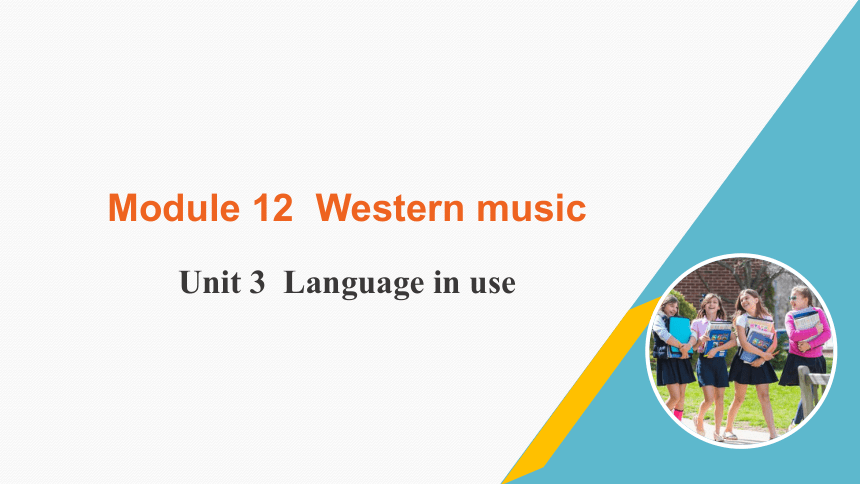
|
|
| 格式 | pptx | ||
| 文件大小 | 5.0MB | ||
| 资源类型 | 教案 | ||
| 版本资源 | 外研版 | ||
| 科目 | 英语 | ||
| 更新时间 | 2023-12-29 00:00:00 | ||
图片预览

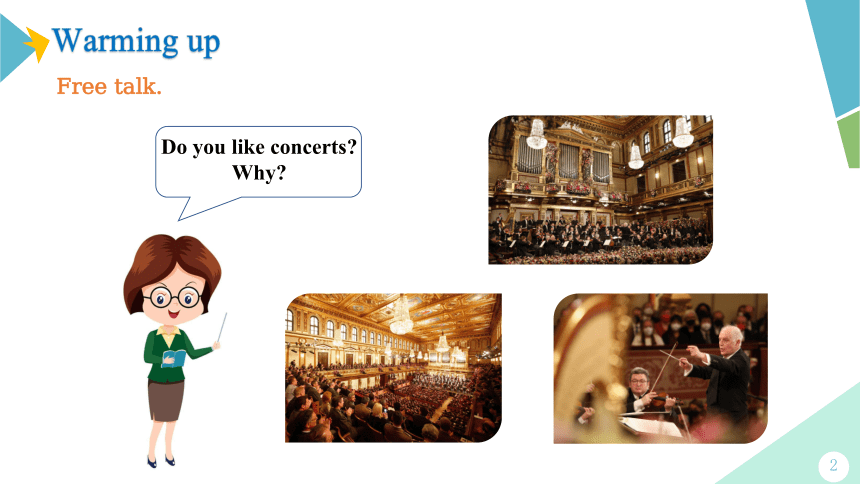
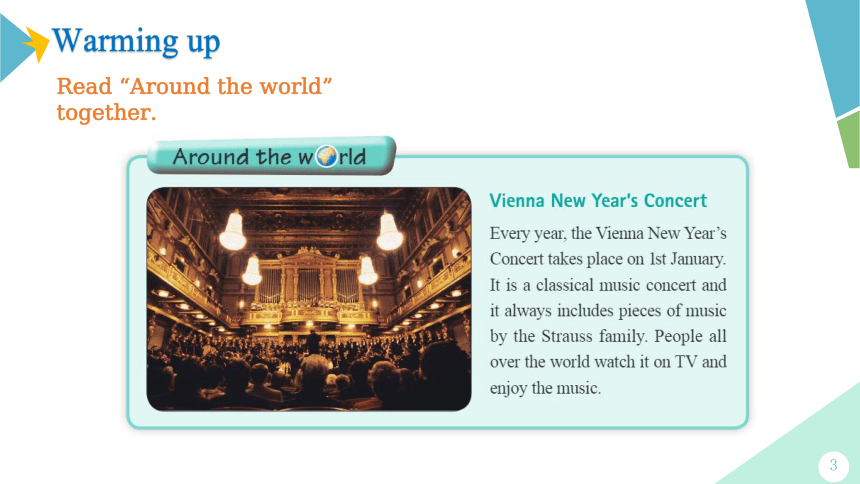
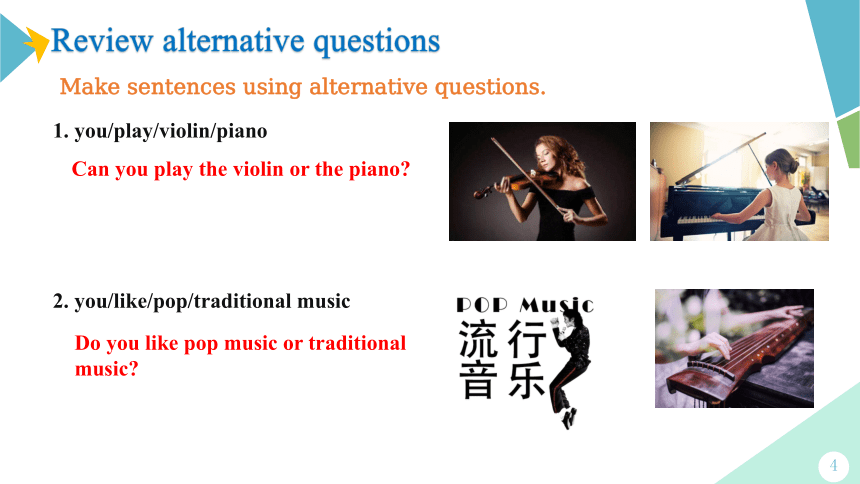
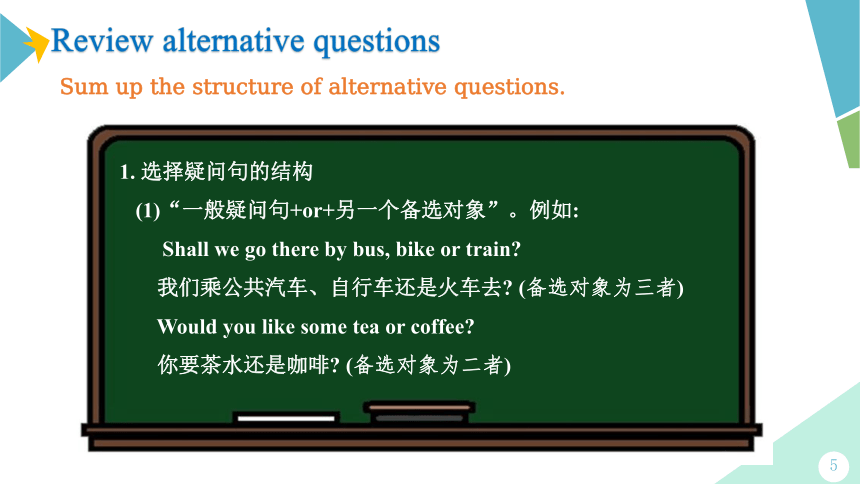
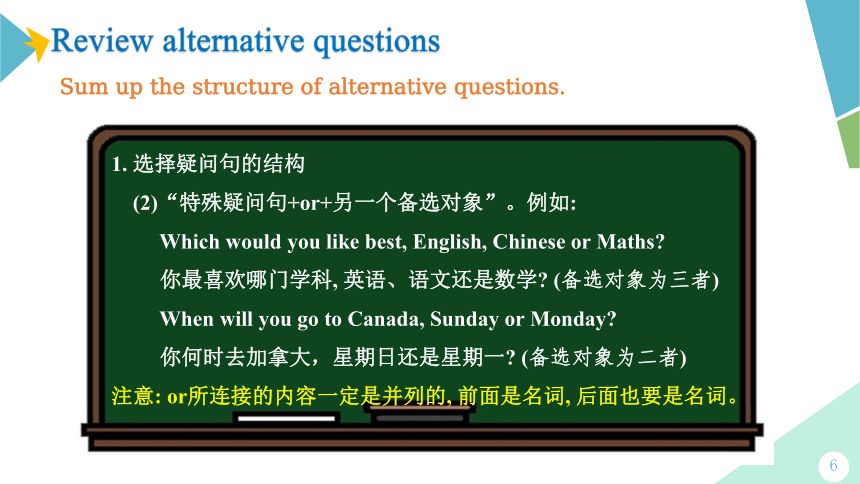
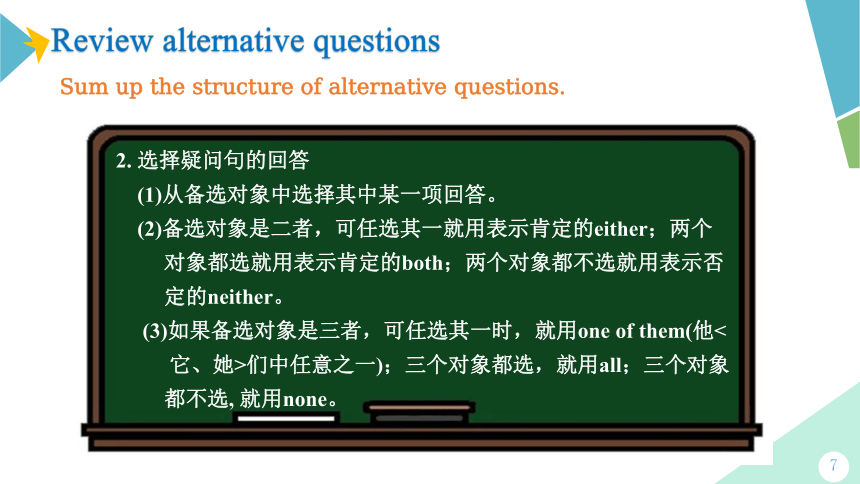
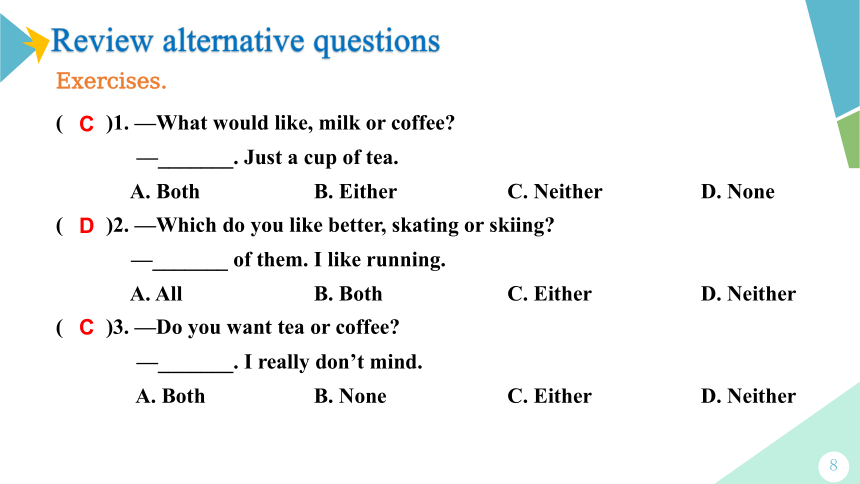
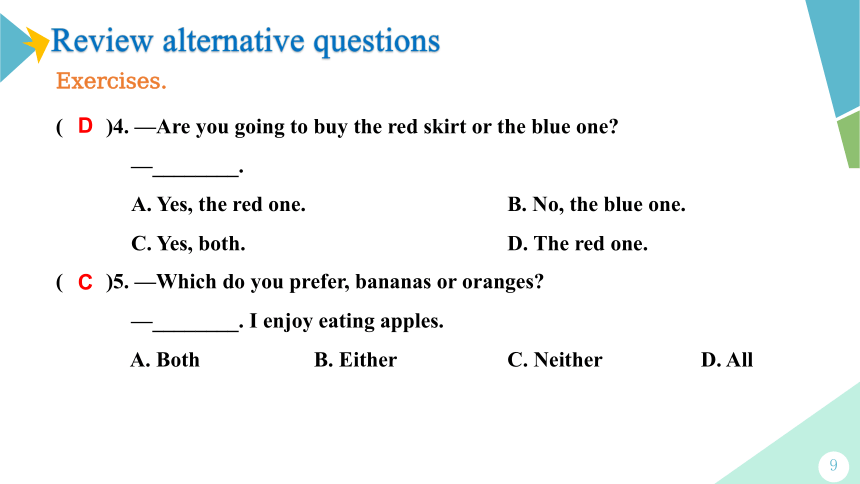
文档简介
(共24张PPT)
Unit 3 Language in use
Module 12 Western music
Warming up
Free talk.
Do you like concerts Why
Warming up
Read “Around the world” together.
Review alternative questions
Make sentences using alternative questions.
1. you/play/violin/piano
2. you/like/pop/traditional music
Can you play the violin or the piano
Do you like pop music or traditional music
Review alternative questions
Sum up the structure of alternative questions.
1. 选择疑问句的结构
(1)“一般疑问句+or+另一个备选对象”。例如:
Shall we go there by bus, bike or train
我们乘公共汽车、自行车还是火车去 (备选对象为三者)
Would you like some tea or coffee
你要茶水还是咖啡 (备选对象为二者)
Review alternative questions
Sum up the structure of alternative questions.
1. 选择疑问句的结构
(2)“特殊疑问句+or+另一个备选对象”。例如:
Which would you like best, English, Chinese or Maths
你最喜欢哪门学科, 英语、语文还是数学 (备选对象为三者)
When will you go to Canada, Sunday or Monday
你何时去加拿大,星期日还是星期一 (备选对象为二者)
注意: or所连接的内容一定是并列的, 前面是名词, 后面也要是名词。
Review alternative questions
Sum up the structure of alternative questions.
2. 选择疑问句的回答
(1)从备选对象中选择其中某一项回答。
(2)备选对象是二者,可任选其一就用表示肯定的either;两个
对象都选就用表示肯定的both;两个对象都不选就用表示否
定的neither。
(3)如果备选对象是三者,可任选其一时,就用one of them(他<
它、她>们中任意之一);三个对象都选,就用all;三个对象
都不选, 就用none。
( )1. —What would like, milk or coffee
—_______. Just a cup of tea.
A. Both B. Either C. Neither D. None
( )2. —Which do you like better, skating or skiing
—_______ of them. I like running.
A. All B. Both C. Either D. Neither
( )3. —Do you want tea or coffee
—_______. I really don’t mind.
A. Both B. None C. Either D. Neither
Exercises.
Review alternative questions
C
D
C
( )4. —Are you going to buy the red skirt or the blue one
—________.
A. Yes, the red one. B. No, the blue one.
C. Yes, both. D. The red one.
( )5. —Which do you prefer, bananas or oranges
—________. I enjoy eating apples.
A. Both B. Either C. Neither D. All
Exercises.
Review alternative questions
D
C
Review exclamations
Write exclamations with What (a)...!
This is beautiful music. What beautiful music this is!
1. Vienna is a beautiful old city.
2. It is a successful concert.
3. They are playing noisy drums.
4. It was a wonderful party.
5. Mozart is a famous composer.
What a beautiful old city Vienna is!
What a successful concert it is!
What noisy drums they are playing!
What a wonderful party it was!
What a famous composer Mozart is!
Review exclamations
Sum up the structure of exclamations.
1. 感叹句的定义:表达强烈情绪(喜、怒、哀、乐、惊、恐等)的
句子叫做感叹句。
2. 感叹句的四种方式:
(a)使用感叹词;
(b)只用情绪感觉的词语;
例如:
Water! Water! Quick! (水! 水! 快!——如救火或救人时。)
Review exclamations
Sum up the structure of exclamations.
2. 感叹句的四种方式:
(c)使用“How...!”或“What (a)...!”的句式;
例如: How beautiful you are, Helen! (海伦,你是多么美!)
What a beautiful flower it is! (这一朵花多么美!)
(d)使用简短的陈述句配合音调也可以表达感叹。
例如: You are kidding! (你在开玩笑!——表示惊讶)
I love you! (我爱你!——表示喜欢)
Review exclamations
Sum up the structure of exclamations.
3. 感叹句的结构:
How+形容词+a/an+名词+陈述语序
How+形容词或副词+陈述语序
What+名词+陈述语序
What+a/an+形容词+名词+陈述语序
What+形容词+复数名词+陈述语序
What+形容词+不可数名词+陈述语序
Review exclamations
Have a match.
Work in groups of four to write as many exclamations as you can. The group will win the match if you have the fewest mistakes.
Deal with words
Put the words and expressions into the right column.
drum fan musician piano pop rock traditional music violin
Types of music Instruments People
pop
rock
traditional music
drum
piano
violin
fan
musician
Lingling: This is beautiful music. Who wrote it, Betty
Betty: Beethoven wrote it. He was a great musician. I (1)______ his music. Lingling: Me too. Did he live at the same time as Mozart
Betty: Yes, he was born in 1770 and began to (2)______ music at an early age.
He (3)_______ his first piano concert when he was only seven.
Lingling: When did he start to (4)_______ music
Deal with words
Complete the conversation with the correct form of the words from the box.
come give hear learn love write
love
learn
gave
write
Betty: Very early. His first work (5)_______ out before the age of thirteen.
Lingling: Was Beethoven famous at that time
Betty: Yes. But he began to lose his hearing. In the last ten years of Beethoven’s
life, he (6)_______ nothing.
Lingling: That’s sad!
Betty: Yes, but he still played the piano. He died when he was fifty-six.
Deal with words
Complete the conversation with the correct form of the words from the box.
come give hear learn love write
came
heard
Module task: Talking about Chinese music
Work in pairs. Talk about one or two types of Chinese music.
beautiful fast lively modern sad slow
● Choose one or two types of Chinese music and describe them. Use the words
from the box.
● Say which types of music you like. Give your reasons.
Module task: Talking about Chinese music
Present your dialogues in pairs.
Module task: Talking about Chinese music
Write a short passage named “My favorite music”. Say which type of music you like and give reasons.
My favorite music
I like different types of music, such as classical music, rock music, country music and so on. But I like movie music best. Movie music is often about our life, and it is easy to learn. So it is very popular in the world. I often listen to it. It makes my life colorful. It makes me happy, makes me moved, and sometimes makes me sad. It is also a good way to learn English.
Summing up & Homework
Summarize what you learned.
1. Words:
noisy, rock, sound, violin, voice, drum, lively,
modern, pop
2. Sentence patterns:
选择疑问句的结构
(1)一般疑问句+or+另一个备选对象
(2)特殊疑问句+or+另一个备选对象
Summing up & Homework
Summarize what you learned.
2. Sentence patterns:
感叹句的结构
How+形容词+a/an+名词+陈述语序!
How+形容词或副词+陈述语序!
What+名词+陈述语序!
What+a/an+形容词+单数名词+陈述语序!
What+形容词+复数名词+陈述语序!
What+形容词+不可数名词+陈述语序!
Summing up & Homework
Homework.
1. Go on finishing the composition.
2. Recite the structures of alternative
questions and exclamations.
3. Surf on the Internet for the information
of new music or songs in different
countries.
Unit 3 Language in use
Module 12 Western music
Warming up
Free talk.
Do you like concerts Why
Warming up
Read “Around the world” together.
Review alternative questions
Make sentences using alternative questions.
1. you/play/violin/piano
2. you/like/pop/traditional music
Can you play the violin or the piano
Do you like pop music or traditional music
Review alternative questions
Sum up the structure of alternative questions.
1. 选择疑问句的结构
(1)“一般疑问句+or+另一个备选对象”。例如:
Shall we go there by bus, bike or train
我们乘公共汽车、自行车还是火车去 (备选对象为三者)
Would you like some tea or coffee
你要茶水还是咖啡 (备选对象为二者)
Review alternative questions
Sum up the structure of alternative questions.
1. 选择疑问句的结构
(2)“特殊疑问句+or+另一个备选对象”。例如:
Which would you like best, English, Chinese or Maths
你最喜欢哪门学科, 英语、语文还是数学 (备选对象为三者)
When will you go to Canada, Sunday or Monday
你何时去加拿大,星期日还是星期一 (备选对象为二者)
注意: or所连接的内容一定是并列的, 前面是名词, 后面也要是名词。
Review alternative questions
Sum up the structure of alternative questions.
2. 选择疑问句的回答
(1)从备选对象中选择其中某一项回答。
(2)备选对象是二者,可任选其一就用表示肯定的either;两个
对象都选就用表示肯定的both;两个对象都不选就用表示否
定的neither。
(3)如果备选对象是三者,可任选其一时,就用one of them(他<
它、她>们中任意之一);三个对象都选,就用all;三个对象
都不选, 就用none。
( )1. —What would like, milk or coffee
—_______. Just a cup of tea.
A. Both B. Either C. Neither D. None
( )2. —Which do you like better, skating or skiing
—_______ of them. I like running.
A. All B. Both C. Either D. Neither
( )3. —Do you want tea or coffee
—_______. I really don’t mind.
A. Both B. None C. Either D. Neither
Exercises.
Review alternative questions
C
D
C
( )4. —Are you going to buy the red skirt or the blue one
—________.
A. Yes, the red one. B. No, the blue one.
C. Yes, both. D. The red one.
( )5. —Which do you prefer, bananas or oranges
—________. I enjoy eating apples.
A. Both B. Either C. Neither D. All
Exercises.
Review alternative questions
D
C
Review exclamations
Write exclamations with What (a)...!
This is beautiful music. What beautiful music this is!
1. Vienna is a beautiful old city.
2. It is a successful concert.
3. They are playing noisy drums.
4. It was a wonderful party.
5. Mozart is a famous composer.
What a beautiful old city Vienna is!
What a successful concert it is!
What noisy drums they are playing!
What a wonderful party it was!
What a famous composer Mozart is!
Review exclamations
Sum up the structure of exclamations.
1. 感叹句的定义:表达强烈情绪(喜、怒、哀、乐、惊、恐等)的
句子叫做感叹句。
2. 感叹句的四种方式:
(a)使用感叹词;
(b)只用情绪感觉的词语;
例如:
Water! Water! Quick! (水! 水! 快!——如救火或救人时。)
Review exclamations
Sum up the structure of exclamations.
2. 感叹句的四种方式:
(c)使用“How...!”或“What (a)...!”的句式;
例如: How beautiful you are, Helen! (海伦,你是多么美!)
What a beautiful flower it is! (这一朵花多么美!)
(d)使用简短的陈述句配合音调也可以表达感叹。
例如: You are kidding! (你在开玩笑!——表示惊讶)
I love you! (我爱你!——表示喜欢)
Review exclamations
Sum up the structure of exclamations.
3. 感叹句的结构:
How+形容词+a/an+名词+陈述语序
How+形容词或副词+陈述语序
What+名词+陈述语序
What+a/an+形容词+名词+陈述语序
What+形容词+复数名词+陈述语序
What+形容词+不可数名词+陈述语序
Review exclamations
Have a match.
Work in groups of four to write as many exclamations as you can. The group will win the match if you have the fewest mistakes.
Deal with words
Put the words and expressions into the right column.
drum fan musician piano pop rock traditional music violin
Types of music Instruments People
pop
rock
traditional music
drum
piano
violin
fan
musician
Lingling: This is beautiful music. Who wrote it, Betty
Betty: Beethoven wrote it. He was a great musician. I (1)______ his music. Lingling: Me too. Did he live at the same time as Mozart
Betty: Yes, he was born in 1770 and began to (2)______ music at an early age.
He (3)_______ his first piano concert when he was only seven.
Lingling: When did he start to (4)_______ music
Deal with words
Complete the conversation with the correct form of the words from the box.
come give hear learn love write
love
learn
gave
write
Betty: Very early. His first work (5)_______ out before the age of thirteen.
Lingling: Was Beethoven famous at that time
Betty: Yes. But he began to lose his hearing. In the last ten years of Beethoven’s
life, he (6)_______ nothing.
Lingling: That’s sad!
Betty: Yes, but he still played the piano. He died when he was fifty-six.
Deal with words
Complete the conversation with the correct form of the words from the box.
come give hear learn love write
came
heard
Module task: Talking about Chinese music
Work in pairs. Talk about one or two types of Chinese music.
beautiful fast lively modern sad slow
● Choose one or two types of Chinese music and describe them. Use the words
from the box.
● Say which types of music you like. Give your reasons.
Module task: Talking about Chinese music
Present your dialogues in pairs.
Module task: Talking about Chinese music
Write a short passage named “My favorite music”. Say which type of music you like and give reasons.
My favorite music
I like different types of music, such as classical music, rock music, country music and so on. But I like movie music best. Movie music is often about our life, and it is easy to learn. So it is very popular in the world. I often listen to it. It makes my life colorful. It makes me happy, makes me moved, and sometimes makes me sad. It is also a good way to learn English.
Summing up & Homework
Summarize what you learned.
1. Words:
noisy, rock, sound, violin, voice, drum, lively,
modern, pop
2. Sentence patterns:
选择疑问句的结构
(1)一般疑问句+or+另一个备选对象
(2)特殊疑问句+or+另一个备选对象
Summing up & Homework
Summarize what you learned.
2. Sentence patterns:
感叹句的结构
How+形容词+a/an+名词+陈述语序!
How+形容词或副词+陈述语序!
What+名词+陈述语序!
What+a/an+形容词+单数名词+陈述语序!
What+形容词+复数名词+陈述语序!
What+形容词+不可数名词+陈述语序!
Summing up & Homework
Homework.
1. Go on finishing the composition.
2. Recite the structures of alternative
questions and exclamations.
3. Surf on the Internet for the information
of new music or songs in different
countries.
同课章节目录
- Module 1 Lost and found
- Unit 1 Whose bag is this?
- Unit 2 Are they yours?
- Unit 3 Language in use
- Module 2 What can you do ?
- Unit 1 I can play the piano
- Unit 2 I can run really fast
- Unit 3 Language in use
- Module 3 Making plans
- Unit 1 What are you going to do at the weekends?
- Unit 2 We're going to cheer the players.
- Unit 3 Language in use
- Module 4 Life in the future
- Unit 1 Everyone will study at home
- Unit 2 Every family will have a small plane.
- Unit 3 Language in use
- Module 5 Shopping
- Unit 1 What can I do for you?
- Unit 2 You can buy everything on the Internet
- Unit 3 Language in use
- Module 6 Around town
- Unit 1 Could you tell me how to get to the Nationa
- Unit 2 The London Eye is on your right.
- Unit 3 Language in use
- Revision module A
- Module 7 My past life
- Unit 1 I was born in a small village.
- Unit 2 I was born in Quincy.
- Unit 3 Language in use
- Module 8 Story time
- Unit 1 Once upon a time….
- Unit 2 Goldilocks hurried out of the house.
- Unit 3 Language in use
- Module 9 Life history
- Unit 1 He left school and began work at the age of
- Unit 2 He decided to be an actor.
- Unit 3 Language in use
- Module 10 A holiday journey
- Unit 1 What did you do?
- Unit 2 This morning we took a walk.
- Unit 3 Language in use
- Module 11 Body language
- Unit 1 They touch noses!
- Unit 2 Here are some ways to welcome them.
- Unit 3 Language in use
- Module 12 Western music
- Unit 1 It's so beautiful!
- Unit 2 Vienna is the centre of European classical
- Unit 3 Language in use
- Revision module B
